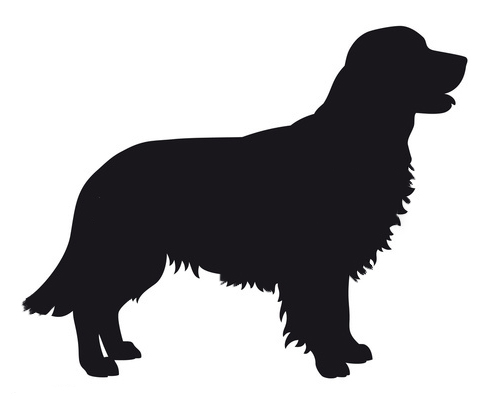
Back in the day, retrievers were classified according to the texture of their coat: Flat coated retrievers, wavy coated retrievers, and curly coated retrievers. Early retrievers were also black, but some dogs had a recessive yellow gene. In fact, at one time, Golden Retrievers were considered a color variation of Flat Coated Retrievers.
Conversely, some people believe there is such a thing as a black Golden Retriever. Note to them: There isn’t.
A purebred Golden Retriever’s glorious color is the a result of two recessive alleles. The MC1R gene (or the E-Locus) controls the production of pigment in melanocytes which controls the color of a dog’s skin or coat. The dominant allele, “E”, allows a dog to produce the black pigment, eumelanin. The recessive allele, “e,” turns all the eumelanin to phaeomelanin which means that the coat will be yellow or red in color. Since all purebred Golden Retrievers have the recessive “e/e” genotype, it’s impossible for a purebred Golden to pass along the dominant “E” allele. They’ll always be some tint or shade of gold or red, but they will never be black.
Genetic mutations do occur, but a color mutation in a Golden Retriever will appear as a patch of black hair like a pigment somatic mutation. If a somatic mutation takes place during the development of the embryo, black patches can appear on recessive Golden Retrievers. It won’t show up as a pure black coat, and this is underscored in the AKC breed standard which reads, “Rich, lustrous golden of various shades…Any noticeable area of black or other off-color hair is a serious fault.”
Unfortunately, there are plenty of websites that say otherwise. One site writes, “Black Golden Retrievers are a variety of the Golden Retriever dog. They have all of the same characteristics of a Golden but come in a midnight shade… They can even be purebred! They are likely black because of genetic diversity that was added to the bloodline in the development of the breed.”
No where does the site mention “genetic mutation” or somatic mutation, possibly because a potential buyer hears “mutation” and runs away from a possible sale. Disingenuous or ignorant breeders (or both) hawk “black Golden Retrievers” as rare and even charge more for them than a heritage Golden Retriever breeder does for a well bred, health tested puppy.
Black marked Golden Retrievers can make marvelous pets, but potential buyers should know that their “purebred black Golden Retriever” either isn’t a purebred, that its “rare” color is a mutation, and that the parent club considers it a fault.

There are, I believe *no* known cases where e has mutated back into normal E. A black golden retriever is always the result of crossbreeding.
My AKC golden retriever was bred with another AKC retriever. The pups all look like normal retrievers except little willow. She has a black spot on the base of her tail. I am assuming it is a somatic mutation but will have her genetics tested. Do I need to offer her as a pet only?
Our caveat, Leona, is to always refer to the breed standard. The AKC standard states in part: Color: Any noticeable area of black or other off-color hair is a serious fault. Notice that it’s not a disqualification, but for someone wanting to show little Willow, that black spot could be problematic. If you’d like, we can post her photo on our own FB page and ask Golden Retriever fanciers if they think her black spot makes her a wonderful companion, and not show prospect. Feel free to send the photo to us.
she can show in obedience, agility/etc no problem. only in conformation is it a problem.
I had a dog growing up that looked like a golden, but was black and had a small white patch on his chest and a bit of white on the tip of his feathery tail. I always thought he was a golden/black lab mix. I can’t believe some people think a dog like that could be pure golden retriever.
And then there are folks who will argue with the person holding the leash that their dog isn’t really a (fill in the blank), and often, they’re the dog’s breeder. People can be funny